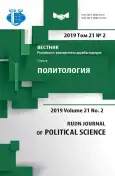PRIMARIES AS A NEW COMMUNICATION FORMAT FOR INTERACTION BETWEEN THE RUSSIAN VOTER AND THE PARTY CANDIDATE
- 作者: Rep’eva I.I1
-
隶属关系:
- The Russian Presidential Academy of National Economy and Public Administration
- 期: 卷 21, 编号 2 (2019)
- 页面: 195-207
- 栏目: POLITICAL PROCESS IN CONTEMPORARY RUSSIA: TENDENCIES AND PROSPECTS
- URL: https://medbiosci.ru/2313-1438/article/view/339697
- DOI: https://doi.org/10.22363/2313-1438-2019-21-2-195-207
- ID: 339697
如何引用文章
全文:
详细
The transformation of electoral processes, as well as the introduction of new elements, as a rule, are due to the dynamic development and at the same time the increasing complexity of social relations. One of such manifestations is the active testing party of the mechanism of preliminary intraparty voting to determine the most effective candidates by the United Russia and their subsequent nomination to elected authorities of power. The use of a truly innovative candidate selection mechanism for the Russian Federation, for the first time in which all citizens with active electoral rights could join, was a demonstration of the party’s preparation for participation in the competition for single-mandate constituencies within the framework of the newly returned mixed electoral system in the elections of deputies of the State Duma. In the given conditions, the party declared its readiness to induce its regional organizations to reorient - the main political resource for it should be voter support. The key indirect effect of the use of this tool for the Russian voter was manifested in the expansion of the traditional boundaries of the application of active suffrage. Taking into consideration attention to the emerging practice of both its supporters and critics, as well as attempts to institutionalize, the author analyzed the background of the issue and formulated the advantages and threats brought by the primaries into the Russian electoral process. The basis of the study for the formulation of the problem and the formulation of possible arguments in favor of this procedure were the data of sociological and expert surveys, as well as the existing scientific works of authors who are few in this area of work.
作者简介
Iana Rep’eva
The Russian Presidential Academy of National Economy and Public Administration
编辑信件的主要联系方式.
Email: yana.repeva@mail.ru
Postgraduate Student of the Department of Political Science and Political Management of the Institute of Social Sciences, Russian Presidential Academy of National Economy and Public Administration
Moscow, Russian Federation参考
- Aksenov Yu.М., Popova О.N. Primaries: Historical Experience, Realities and Perspectives. Мoscow: OOO “NIPKTs Voskhod — A”; 2012. 238 p. (In Russ.).
- Meeting in the Kremlin on the 25th Anniversary of the Electoral System. Official Site of the President of the Russian Federation. 30.10.2018. Available from: http://www.kremlin.ru/events/ president/news/58972. Accessed: 28.12.2018 (In Russ.).
- Duverger M. Les Partis Politiques. Paris: Librairie Armand Colin; 1951. 476 p. (In Fr.).
- Democratic Answer to all Questions. Newspaper “Obshchestvenno-politicheskaya gazeta “Bez buldyrabyz!”. 2011; (12—13): 2—3.
- “United Russia” Assigned to the Regions of the Federal Commissioners for the Primaries. Information Agency of Russia “TASS”. 24.10.2015. Available from: https://tass.ru/politika/2376544. Accessed: 05.01.2019 (In Russ.).
- “United Russia”: Primaries-2018 on the Background of Rebranding. Information Agency Regnum. 28.05.2018. Available from: https://regnum.ru/news/2421460.html. Accessed: 02.02.2019 (In Russ.).
- Zudin. A.Yu. The Quiet Revolution of the Party System. Journal “Expert”. 2018; (48): 48—52 (In Russ.).
- Campaign Tools: Has the New Political Reality Come? Issledovanie Komiteta po politicheskim tekhnologiyam RASO. 13.12.2018. Available from: http://www.politteh.ru/netcat_files/userfiles/ 1/Komitet_issledovanie_13.12.18.pdf. Accessed: 25.12.2018 (In Russ.).
- Medvedev D.A. 25 Years of the Constitution: A Balance between Freedom and Responsibility. Zakon. 2018; (12): 8—16 (In Russ.).
- New Political Reality and New Opportunities. Minchenko Consulting. 07.02.2019. Available from: http://www.minchenko.ru/netcat_files/userfiles/Novaya_politicheskaya_realnost_i_novye_ vozmozhnosti_07.02.19.pdf. Accessed: 09.02.2019 (In Russ.).
- Approval of Government Institutions. Press-vypusk Levada “Tsentr”. 31.01.19. Available from: https://www.levada.ru/2019/01/31/odobrenie-institutov-vlasti-9/. Accessed: 01.02.19 (In Russ.).
- United Russia Primaries. Dossier. Information Agency of Russia “TASS”. 15.02.2016. Available from: https://tass.ru/info/2669202. Accessed: 26.12.2018 (In Russ.).
- United Russia Primaries — 2016. Press-vypusk VTsIOM. 19.05.2016 (3107). Available from: https://wciom.ru/index.php?id=236&uid=115692. Accessed: 02.02.2019 (In Russ.).
- United Russia Primaries: Technology at the Expense of Competition. Analitika Tsentra politicheskoi kon’yunktury. 16.10.2015. Available from: http://cpkr.ru/comments/praymeriz-edinoyrossii-tehnologii-v-ushcherb-konkurencii. Accessed: 10.02.2019 (In Russ.).
- Russian Primaries Tried on the World. Newspaper “Kommersant”. 25.06.2016. Available from: https://www.kommersant.ru/doc/2995705. Accessed: 09.02.2019 (In Russ.).
- Chervonyuk V.I., Zotin M.Yu. Constitutional Meaning of Primary Elections. Vestnik Moskovskogo universiteta MVD Rossii. 2017; (1): 38—42.
- Shishkina N.E. “Primaries” as a Pre-stage of the Electoral Process. Sibirskii yuridicheskii vestnik. 2008; (1): 30—34.
- The Evolution of Elections: 25 Years of Experience in the Development of the Electoral System in Modern Russia. Vestnik Tsentral'noi izbiratel'noi komissii Rossiiskoi Federatsii. 10.12.2018. Available from: http://vestnik.cikrf.ru/vestnik/25-let/41690.html. Accessed: 06.02.2019.
- “Electoral Russia — 2016: The Battle for the State Duma”. Annual Collection of Articles on Russian Elections. Agency of Strategic Communications “Nikkolo M”. Moscow: Izdatel'stvo “Grifon”; 2016. 336 p.
补充文件









